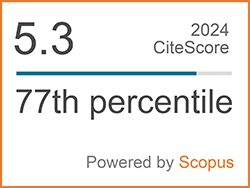Enhancing Disturbance Rejection of PID Controllers for DC Joint Motors of Trajectory Tracking Robots Using Disturbance Observer
Abstract
Keywords
[1] F. Nagata and K. Watanabe, Controller Design for Industrial Robots and Machine Tools: Applications to Manufacturing Processes. Wisconsin: Woodhead, 2013, pp. 91–112.
[2] M. Wilson, Implementation of Robot Systems. Amsterdam, Netherlands: Elsevier, 2015, pp. 75–102.
[3] D. G. Caldwell, Robotics and Automation in the Food Industry. Wisconsin: Woodhead, 2013, pp. 21–34.
[4] R. N. Jazar, Theory of Applied Robotics, 2nd ed., Berlin, Germany: Springer, 2010, pp. 838–842.
[5] C. Fallaha, M. Saad, J. Ghommam, and Y. Kali, “Sliding mode control with model-based switching functions applied on a 7-DOF exoskeleton arm,” IEEE/ASME Transactions on Mechatronics, vol. 26, no.1, pp. 539–550, Feb. 2021.
[6] X. Yin and L. Pan, “Enhancing trajectory tracking accuracy for industrial robot with robust adaptive control,” Robotics and Computer-Integrated Manufacturing, vol. 51, pp. 97–102, Jun. 2018.
[7] S. Chen and J. T. Wen, “Industrial robot trajectory tracking control using multi-layer neural networks trained by iterative learning control,” Robotics, vol. 10, no. 1, Mar. 2021, Art. no. 50.
[8] S. Ling, H. Wang, and P. X. Liu, “Adaptive fuzzy tracking control of flexible-joint robots based on command filtering,” IEEE Transactions on Industrial Electronics, vol. 67, no. 5, pp. 4046–4055, May. 2020.
[9] K. Ohishi, K. Ohnishi, and K. Miyachi, “Torque – speed regulation of DC motor based on load torque estimation method,” in International Power Electronics Conference, 1983, pp. 1209–1218.
[10] S. Emre, O. Roberto, and O. Kouhei, “Disturbance observer-based robust control and its applications: 35th anniversary overview,” IEEE Transactions on Industrial Electronics, vol. 67, no. 3, pp. 2042–2053, Mar. 2020.
[11] S. Emre and O. Kouhei, “Stability and robustness of disturbance observer based motion control systems,” IEEE Transactions on Industrial Electronics, vol. 62, no. 1, pp. 414–422, Jan. 2015.
[12] R. Carlson, M. Lajoie-Mazenc, and J. C. d. S. Fagundes, “Analysis of torque ripple due to phase commutation in brushless DC machines,” IEEE Transactions on Industry Applications, vol. 28, no. 3, pp. 632–638, May 1992.
[13] Ramin S. Esfandiari, and B. Lu, Modeling and Analysis of Dynamic Systems, 3rd ed., Florida: CRC Press, 2018, pp. 295–296.
[14] H. K. Khalil, Nonlinear Systems, 3rd ed., New Jersey: Prentice Hall, 2002, pp. 346–350.
[15] S. P. Bhattacharyya, A. Datta, and L. H. Keel, Linear Control Theory: Structure, Robustness, and Optimization. Florida: CRC Press, 2009.
[16] R. K. Yedavalli, Robust Control of Uncertain Dynamic Systems. Berlin, Germany: Springer, 2014, pp. 47–59.
[17] G.-R. Duan, and H.-H. Yu, LMIs in Control Systems. Florida: CRC Press, 2013, pp. 110–119.
DOI: 10.14416/j.asep.2023.02.003
Refbacks
- There are currently no refbacks.
 Applied Science and Engineering Progress
Applied Science and Engineering Progress







